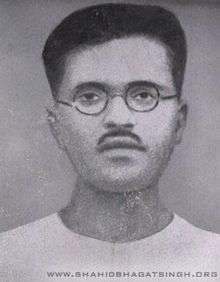Bhagwati Charan Vohra
Bhagwati Charan Vohra (15 November 1903 – 28 May 1930) was an Indian revolutionary, associated with Hindustan Socialist Republican Association. He was an ideologue, organiser, orator, and a campaigner.
Bhagwati Charan Vohra | |
|---|---|
 | |
| Born | 15 November 1903 Lahore, British India |
| Died | 28 May 1930 (aged 26) Lahore, British India |
| Organization | Hindustan Socialist Republican Association, Naujawan Bharat Sabha |
| Movement | Indian independence movement |
| Spouse(s) | Durgawati Devi |
| Children | Sachindra Vohra |
Revolutionary life
Vohra left college to join the satyagraha movement in 1921, and after the movement was called off, joined National College, Lahore where he got a BA degree. It was there that he was initiated into the revolutionary movement. He along with Bhagat Singh and Sukhdev started a study circle on the model of the Russian Socialist Revolution.
Vohra was an avid reader. He played a key role in infusing intellectual ideology in the functioning roots of the organizations he worked with. He was not influenced by caste prejudices and worked for Hindu-Muslim unity as well as the upliftment of the poor by use of socialist principles.
In 1926, when the Naujawan Bharat Sabha revolutionary organization was formed by his friend, he was appointed the propaganda secretary of the organization.[1] On 6 April 1928, Vohra and Bhagat Singh prepared the manifesto of Naujwan Bharat Sabha and urged the young Indians to have the triple motto "service, suffering, sacrifice", as their sole guide to achieve the goal of independence.
In September 1928, many young revolutionaries met at Ferozshah Kotla ground in Delhi and reorganized the Hindustan Republican Association into the Hindustan Socialist Republican Association (HSRA) under the leadership Chandrashekhar Azad. Vohra was appointed Propaganda Secretary and prepared the HSRA manifesto that was widely distributed at the time of the Lahore Session of the Congress.[2] He was also party to murder of J. P. Saunders and the throwing of bombs in Central Assembly Hall by Singh and Batukeshwar Dutt.
Philosophy of Bomb
In 1929 he rented room No. 69, Kashmir Building, Lahore and used it as a bomb factory. He planned and executed the 23 December 1929 bomb blast under the train of Viceroy Lord Irwin on the Delhi-Agra railway line. The viceroy escaped unhurt and Mahatma Gandhi thanked God for the narrow escape, condemning the revolutionary act through his article The Cult of Bomb.
In response to Gandhi's article, Vohra, in consultation with Azad, wrote an article entitled The Philosophy of Bomb. It appealed to youths to come forward and join them.
The concluding paragraph of the article reads
There is no crime that Britain has not committed in India. Deliberate misrule has reduced us to paupers, has ‘bled us white’. As a race and a people, we stand dishonoured and outraged. Do people still expect us to forget and to forgive? We shall have our revenge – a people’s righteous revenge on the tyrant. Let cowards fall back and cringe for compromise and peace. We ask not for mercy and we give no quarter. Ours is a war to the end – to Victory or Death.
Death
Vohra died in Lahore[3] on 28 May 1930 while testing a bomb on the banks of the Ravi. The device was required for the proposed rescue of Singh and others under trial in the Lahore Conspiracy Case but it exploded during the test and he was severely wounded.
He was survived by his wife Durgawati Devi (popularly known as Durga Bhabhi to the revolutionaries) and a son, Sachindra Vohra.
See also
References
- Mittal, S.K.; Habib, Irfan (September 1979). "Towards Independence and Socialist Republic: Naujawan Bharat Sabha: Part One". Social Scientist. 8 (2): 18–29. doi:10.2307/3516698. JSTOR 3516698.
- Tapinder Pal Singh Aujla. "Shaheed Bhagat Singh". Shahidbhagatsingh.org. Retrieved 2 January 2013.
- Firth, Colin; Arnove, Anthony (13 September 2012). The People Speak: Democracy is not a Spectator Sport. Canongate Books. ISBN 9780857864475.